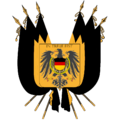Monarchy of Acrea: Difference between revisions
No edit summary |
No edit summary |
||
| Line 15: | Line 15: | ||
| other = | | other = | ||
| heir_apparent = <!-- Optional. --> | | heir_apparent = <!-- Optional. --> | ||
| heir_presumptive = Liana Katharina | | heir_presumptive = Liana Katharina Kronprinzessin von Reichenau | ||
| first_monarch = | | first_monarch = | ||
| formation = October 1427 | | formation = October 1427 | ||
| Line 25: | Line 25: | ||
The '''Monarchy of Acrea''' is the monarchy of the [[Acrea|Kingdom of Acrea]]. It is a constitutional monarchy, with the role and position of the monarch being defined and limited in the Acrean constitution, the ''Nördreichischer Verfassungsurkunde'', that was written in 1815. As a result, a large part of the constitution is devoted to the monarchy describing everything from laws of succession, roles and responsibilities, formalities, relationship of the monarchy with the Reichstag and the Kanzleramt, and the role of the monarch in legislative duties and normal government functions. | The '''Monarchy of Acrea''' is the monarchy of the [[Acrea|Kingdom of Acrea]]. It is a constitutional monarchy, with the role and position of the monarch being defined and limited in the Acrean constitution, the ''Nördreichischer Verfassungsurkunde'', that was written in 1815. As a result, a large part of the constitution is devoted to the monarchy describing everything from laws of succession, roles and responsibilities, formalities, relationship of the monarchy with the Reichstag and the Kanzleramt, and the role of the monarch in legislative duties and normal government functions. | ||
The monarchy undertakes various official, unofficial, ceremonial, diplomatic, and representational duties as part of its responsibilities appointed by the constitution. The monarch is the commander-in-chief of the Acrean Armed Forces. Although ultimate executive authority rests with the monarch, because of the limitations of the constitution | The monarchy undertakes various official, unofficial, ceremonial, diplomatic, and representational duties as part of its responsibilities appointed by the constitution. The monarch is the commander-in-chief of the Acrean Armed Forces. Although ultimate executive authority rests with the monarch, because of the limitations of the constitution a number of powers can be used only in accordance to the laws of the Reichstag. However, by far the greatest restriction on the monarchy's power is nothing but precedent and convention. | ||
== Succession == | == Succession == | ||
Revision as of 05:16, 4 April 2019
| King of Acrea | |
|---|---|
| König des Nördreichs | |
Federal | |
 | |
| Incumbent | |
 | |
| Friedrich Leopold III von Reichenau since 9 September 1968 | |
| Details | |
| Style | His Royal Majesty |
| Heir presumptive | Liana Katharina Kronprinzessin von Reichenau |
| Formation | October 1427 |
| Residence | Königshaus am Bayersee |
| Appointer | Hereditary |
The Monarchy of Acrea is the monarchy of the Kingdom of Acrea. It is a constitutional monarchy, with the role and position of the monarch being defined and limited in the Acrean constitution, the Nördreichischer Verfassungsurkunde, that was written in 1815. As a result, a large part of the constitution is devoted to the monarchy describing everything from laws of succession, roles and responsibilities, formalities, relationship of the monarchy with the Reichstag and the Kanzleramt, and the role of the monarch in legislative duties and normal government functions.
The monarchy undertakes various official, unofficial, ceremonial, diplomatic, and representational duties as part of its responsibilities appointed by the constitution. The monarch is the commander-in-chief of the Acrean Armed Forces. Although ultimate executive authority rests with the monarch, because of the limitations of the constitution a number of powers can be used only in accordance to the laws of the Reichstag. However, by far the greatest restriction on the monarchy's power is nothing but precedent and convention.
Succession
The monarchy of Acrea passes by right of succession through absolute primogeniture and proximity of blood. Succession is limited only to legitimate heirs, with the sole exception being if there are no possible alternative successors. Even in this case, the constitution provides for a special council that may be called by the Reichstag which gives the Reichstag the power to appoint a new successor deemed suitable upon the suggestion of the government. Often, a reigning monarch gives their official preference and suggestion for who should follow in the event of this occurring, despite the fact that the Reichstag has never called for a special council of succession due to the lack of any successors.
The constitution does not recognise any situation in which Acrea has no monarch, and as a result the accession of an heir occurs the moment the previous monarch no longer holds the throne, whether this is due to death, abdication, or removal by the Reichstag. Whether or not a Coronation takes place is up to the discretion of the newly ascended monarch; although it is traditional for a Coronation to be held, it is not required and if declined a public ceremony is held in the Reichstag in which the new monarch is inaugurated.
| Position | Image | Full Name | Title | Age |
|---|---|---|---|---|
| 1 | Liana Katharina Kronprinzessin von Reichenau | Crown Princess | 29 | |
| 2 | Erich Gustav Prinz von Reichenau | Prince | 29 | |
| 3 | Celina Else Prinzessin von Reichenau | Princess | 27 |


